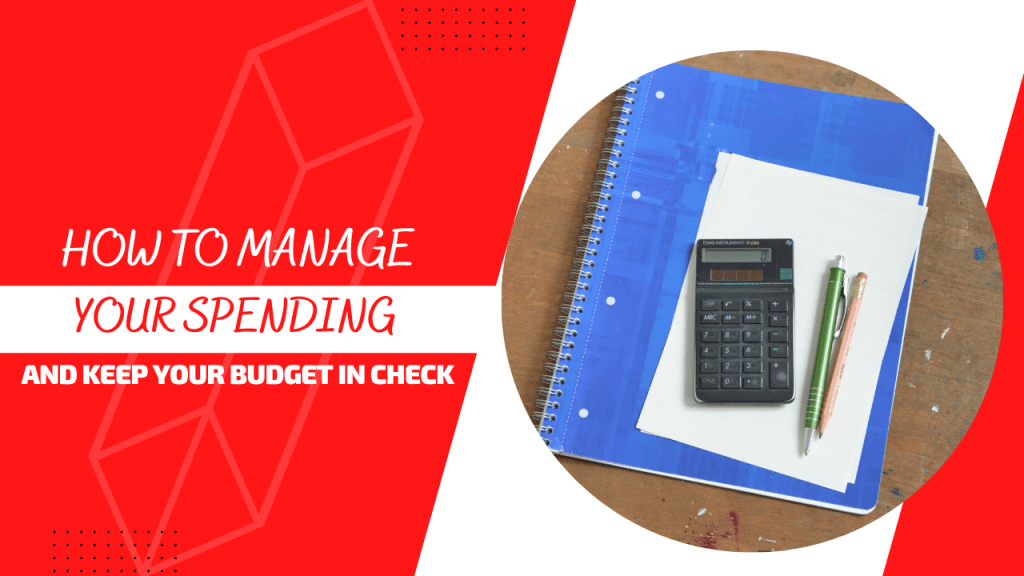How to Manage Your Spending: Tips to Keep Your Budget in Check

Are you tired of living paycheck to paycheck? Do you feel like you’re never able to save any money? If so, you’re not alone. A lot of people have a hard time managing their spending. In this blog post, we will give you some tips that will help you Manage Your Spending. Following these tips will help you get your finances under control and start saving money!
Why should you manage your spending?
When it comes to financial growth, spending plays a pivotal role. It is important to be aware of your spending patterns and track where your money is going. This will help you make informed decisions about your finances and ensure that your spending is in line with your income and financial goals, Managing your spending gives you more control over your finances and make you debt free.
Easy Approaches To manage your spending
- Monitor your Income
- Have a budget
- Identify your spending pattern
- Don’t Buy Impulsively
- Create a savings plan
1) Monitor your Income
Monitoring your income can help you manage your spending. By keeping track of how much money you’re bringing in, you can make sure that your spending doesn’t exceed your income. This can help you avoid debt and financial problems.
If you’re not sure how to monitor your income, there are a few ways you can do it. You can use a budgeting app or spreadsheet to track your income and spending. Or, you can keep track of your income in a notebook.
No matter how you do it, monitoring your income is a key step to managing your spending. By keeping track of your income, you can make sure that your spending doesn’t get out of control. So start monitoring your income today and take control of your finances.
2) Have a budget
A budget is a helpful tool for managing spending. It can help you track where your money is going and make sure you are spending within your means. Having a budget can also help you plan for future expenses and save for financial goals.
If you are not used to budgeting, it may seem like a lot of work. But once you get the hang of it, budgeting can be a simple and effective way to keep your finances on track.
There are many different ways to budget. You can use a traditional pen-and-paper method, or there are many software programs and apps that can help you create and track your budget. Whichever method you choose, the key is to be consistent with it.
3) Identify your spending pattern
First and foremost, you need to be aware of your spending patterns. Track where you are spending your money and how much you are spending. This will help you identify areas where you can cut back. Once you know where your money is going, you can start to make changes.
If you find that you are eating out a lot, try cooking at home more. This can be a big money saver. Another way to save money is to cut back on your entertainment expenses. Instead of going out to the movies, rent a movie or watch one at home. There are also many free or low-cost activities that you can do for entertainment, such as hiking, biking, or attending free concerts or events.
When it comes to your housing costs, there are a few things you can do to Manage Your Spending. If you’re renting, see if you can get a roommate to help split the cost of rent and utilities. If you own your home, make sure you’re not spending more than 30% of your income on your mortgage. You can also save money on your energy bills by making some simple changes, such as turning off lights when you leave a room and using energy-efficient appliances.
4) Don’t Buy Impulsively
When it comes to managing your finances, one of the worst things you can do is buy impulsively. Every time you make an impulse purchase, you’re essentially throwing away money that could have been used more wisely.
If you want to get a handle on your spending, it’s important to learn how to control your impulses. One of the best ways to do this is to simply avoid places where you’re likely to be tempted to spend unnecessarily. For example, if you have a problem with spending too much money on clothes, try avoiding the mall altogether.
Another helpful tip is to make a list of things you need before you go shopping. This way, you’ll be less likely to make impulse purchases. And, if you do find yourself succumbing to temptation, you can at least be sure that you’re buying something that you actually need.
Finally, remember that impulse purchases are often driven by emotions. If you’re feeling down or stressed out, resist the urge to spend money on things you don’t really need. Instead, find other ways to cope with your emotions, such as talking to a friend or going for a walk.
5) Create a savings plan
There’s no doubt that saving money can be tough. But if you can create a savings plan and stick to it, you’ll be on your way to financial success.
There are a few key things to keep in mind when creating a savings plan. First, you need to figure out how much money you can realistically save each month. This will require taking a close look at your income and expenses.
Once you have a good idea of how much you can save, you need to set some goals. What do you want to save for? A rainy day fund? A new car? A down payment on a house? Having specific goals will help you stay motivated to stick to your plan.
Finally, you need to make sure you actually put your savings into action. This means setting up a budget and sticking to it. Automating your savings can also help make it easier to stay on track.
Creating a savings plan can be tough, but it’s worth it. If you can stick to your plan, you’ll be on your way to financial success.
Summary
Managing your spending is not as hard as it seems, especially if you take things one step at a time. By monitoring your income and identifying your spending pattern, you can begin to make small changes that will have a big impact down the line. And remember, don’t buy impulsively give yourself time to think about whether or not a purchase is really worth it. If you can stick to these guidelines, managing your finances will become second nature in no time at all.








